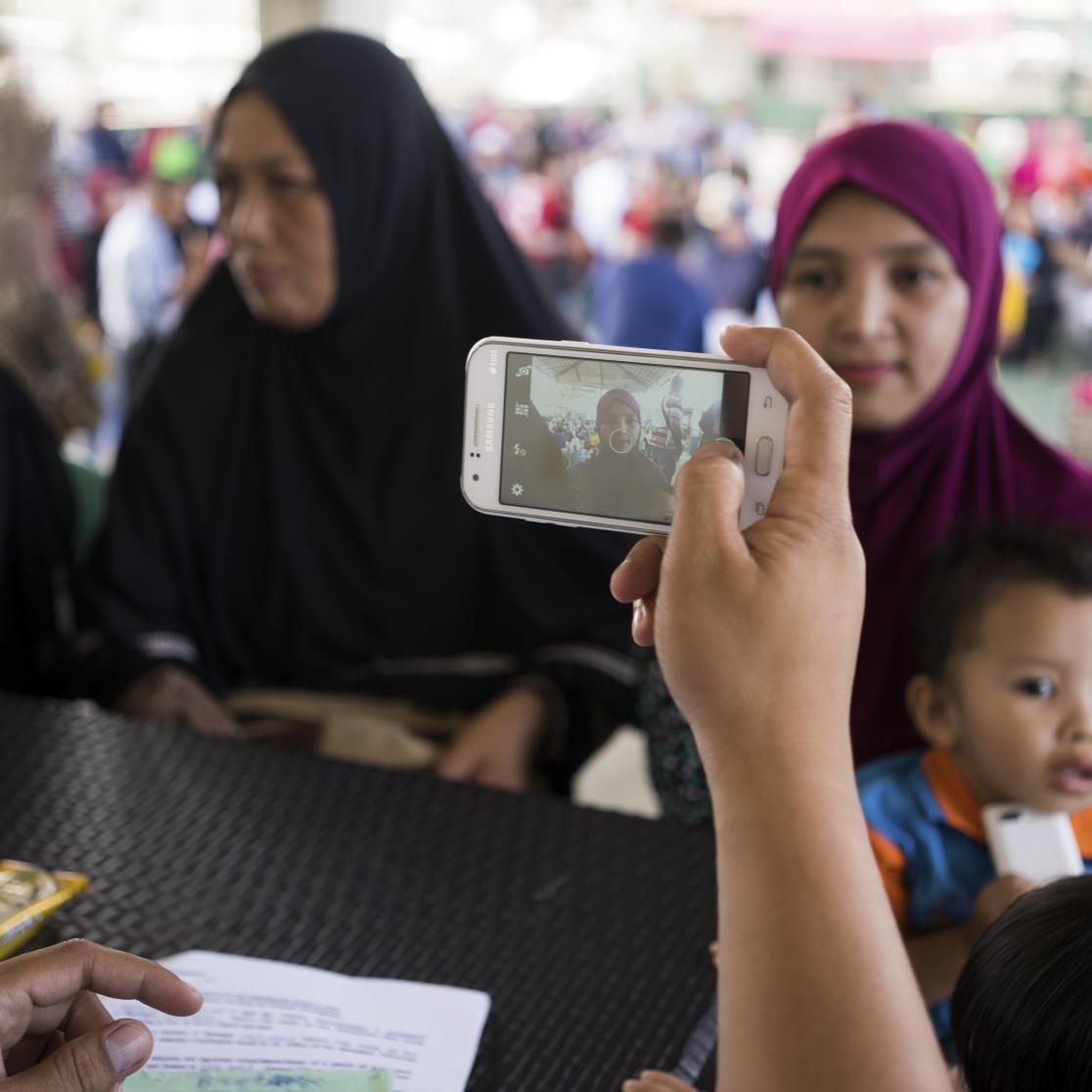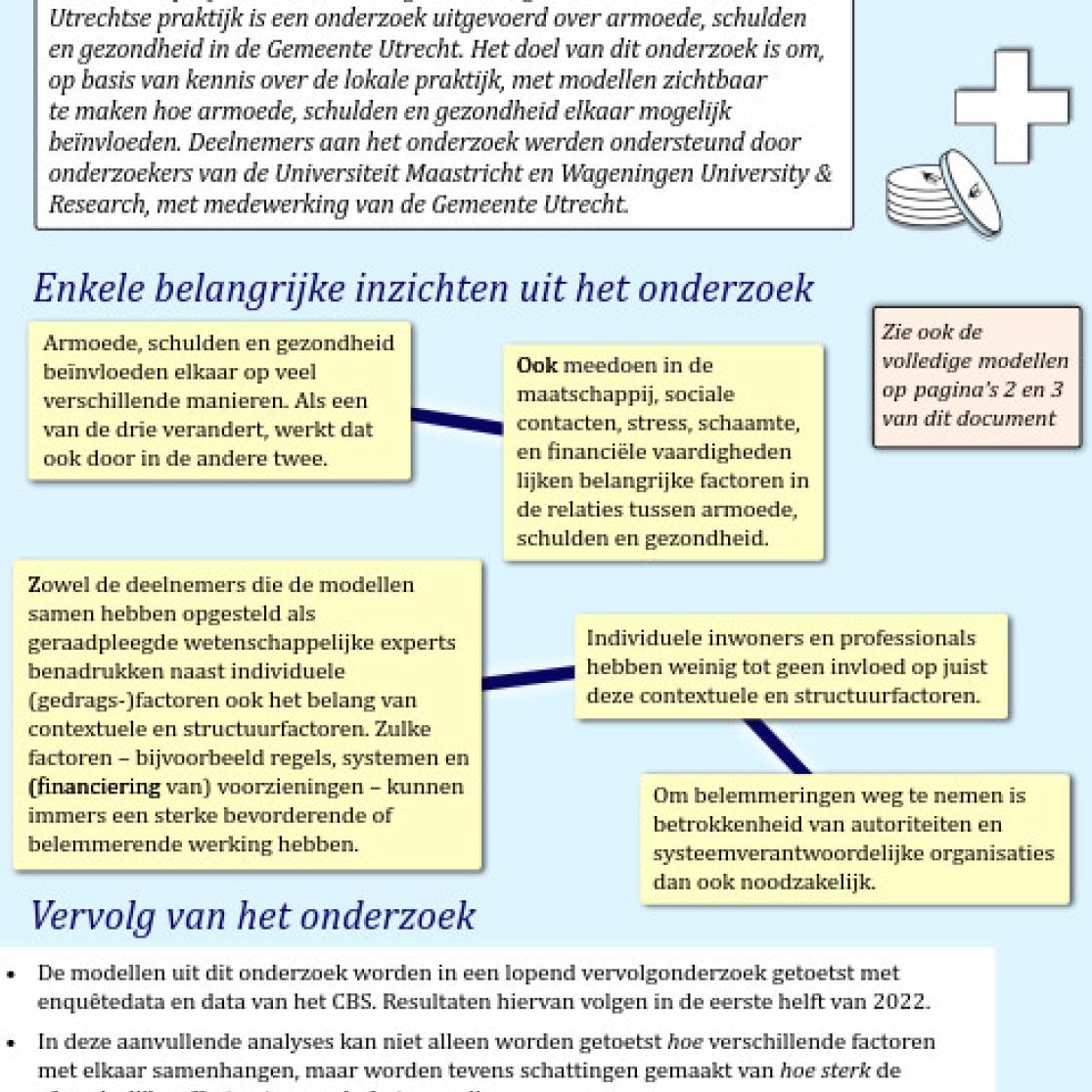The Maastricht University of School of Business and Economics has over 160 exchange contracts with universities and institutions in 40 countries all over the world. On a yearly base, up to 750 SBE students spend part of their studies abroad in an exchange programme, whereas about 650 exchange students visit SBE. Download one of the lists below to find out about our worldwide partner network:
Registration DxU Methods Workshop
Samenvattingsdocument: wederzijdse invloeden tussen armoede en gezondheid in de Gemeente Utrecht
Samen met professionals, ervaringsdeskundigen en beleidsmakers uit de Utrechtse praktijk is een onderzoek uitgevoerd over armoede, schulden en gezondheid in de Gemeente Utrecht.
Onder begeleiding van onderzoekers van de Universiteit Maastricht en Wageningen University & Research werkten deelnemers aan het onderzoek in meerdere sessies samen om een systeem-dynamisch model van de problematiek op te stellen. Dit conceptueel model (tevens opgesplitst in twee deelmodellen) laat, op basis van kennis uit de praktijk, zien hoe zaken rondom armoede een invloed kunnen hebben op gezondheid en andere variabelen, en andersom.
In huidig vervolgonderzoek wordt het model gebruikt als conceptuele input voor kwantificering van een aantal van deze relaties: hiermee worden op basis van statistische berekeningen schattingen gemaakt hoe sterk de relaties zijn. Ook kunnen de indirecte effecten van activiteiten die zijn gericht op een of meerdere factoren in het model, zo worden geschat.
Onderzoekers:
- Laurens Reumers, Universiteit Maastricht
- Marleen Bekker, Wageningen University & Research
- Henk Hilderink, RIVM
- Maria Jansen, Universiteit Maastricht en GGD Zuid-Limburg
- Jan-Kees Helderman, Radboud Universiteit
- Dirk Ruwaard, Universiteit Maastricht
Contact:
Laurens Reumers
Universiteit Maastricht
l.reumers@maastrichtuniversity.nl
2024
The Deelnemersdialoog (Member Dialogue) is a new way for Pensioenfonds Detailhandel to engage with its members, the ultimate asset owners. Around 50 members (“dialogue-makers”) participated, together representing the member base of Pensioenfonds Detailhandel on social, demographic, member status and attitudinal characteristics. This project was a collaboration between Pensioenfonds Detailhandel, Dr Emmeline Cooper (project design and management) and Professor Rob Bauer.
---------------------------------------------------------------------------------------------------------------------------------
Meten is nog geen weten
Written by Rob Bauer for Ondernemingsrecht 2024/35
---------------------------------------------------------------------------------------------------------------------------------
Conference Report - Enhancing sustainable business and corporate regulation in the EU (2024)
The Elverding Conference 2023 on Enhancing sustainable business and corporate regulation in the EU took place on 26 October 2023 at the Maastricht University Faculty of Law. It examined how effective ownership strategies could be used to promote business sustainability and how to align directors' duties and the social role of corporations. It also invited representatives from companies, the investor community, and civil society to identify and explore signals which might boost sustainable business practices and corporate regulation in the EU.
2023
Corporate Sustainability and the Duty of Care of Directors
Written by Mieke Olaerts for Ondernemingsrecht 2023/38
Article 25 of the proposed CSDDD requires directors to take into account the consequences of their decisions for sustainability matters. While the use of directors’ duties as a tool to promote sustainability has been proposed in the past, it has also been criticized. This debate will be explored in this article. It will be argued that even though the introduction of sustainability into directors’ duties will not solve all problems, it should not be overlooked as one of the tools to enhance long-term sustainable decision-making. It is not new since it builds upon the obligations contained in the recently adopted CSRD. Therefore, making this explicit in the duty of the board of directors does not change the content of their task. The fear of interference with directors’ duties at the national level should furthermore not be overstated as Article 25 leaves considerable freedom to Member States with regard to the implementation of this duty.
---------------------------------------------------------------------------------------------------------------------------------
Are companies prepared for the new, emerging standard in biodiversity reporting?
Written by Constantijn van Aartsen for the ECGI Blog: Special Issue on Biodiversity The new, emerging standard in biodiversity reporting (ecgi.global)
The interim draft standards for the CSRD require companies to disclose biodiversity risks, opportunities, dependencies, and impacts. This repeated terminology, suggests that influential players around the world are aligning on these four terms as an emerging standard for global biodiversity reporting.
---------------------------------------------------------------------------------------------------------------------------------
Climate Change, Firm Performance, and Investor Surprises
Written by Panratz, Bauer and Derwall (2023) and published in Management Science
We link records of firm performance, equity analyst forecast errors, and stock returns around companies’ earnings announcements to firm-specific measures of heat exposure for more than 17,000 firms in 93 countries from 1995 to 2019. We find that increased exposure to extremely high temperatures reduces firms’ revenues and operating income. A one-standard-deviation increase in the number of hot days decreases revenues (operating income) by 0.6% (1.8%) of the average quarterly revenue (operating income). Moreover, we provide evidence that increased heat exposure impacts negatively on firm financial performance relative to analyst predictions and on earnings announcement returns. These findings indicate that capital market participants do not fully anticipate the economic consequences of heat as a first order physical climate risk.
---------------------------------------------------------------------------------------------------------------------------------
Walk the green talk? A textual analysis of pension funds’ disclosures of sustainable investing
Written by Bauer, Broeders and Van Ool (2023) and published as a working paper with De Nederlandsche Bank
In this paper, we analyze the disclosures of sustainable investing by Dutch pension funds in their annual reports from 2016 to 2021. We introduce a novel textual analysis approach using state-of-the-art natural language processing (NLP) techniques to measure the awareness and implementation of sustainable investing, where we define awareness as the amount of attention paid to sustainable investing in the annual report. We exploit a proprietary dataset to analyze the relation between pension fund characteristics and sustainable investing. We find that a pension fund’s size increases both the awareness and the implementation of sustainable investing. Moreover, we analyze the role of signing the International Responsible Business Conduct (IRBC) initiative. Large pension funds, pension funds with more female trustees, or pension funds with a positive belief about the risk-return relation of sustainable investing are more likely to sign the IRBC initiative. Although signing this initiative increases the specificity of pension fund statements about sustainable investing, we do not find an effect on the implementation of sustainable investing.
---------------------------------------------------------------------------------------------------------------------------------
Measuring sustainable preferences of pension members: A methodological proposition and a case study of a UK pension fund
Written by Bauer, Ceccarelli, Gödker and Smeets (2023) for the Network for Studies on Pensions, Aging and Retirement (NETSPAR)
In this report, we propose an approach to measure people’s true preferences for sustainable investing. We present an investment game with implications for participants in the real world - implemented with a survey-in-the-field experiment. This approach helps to mitigate concerns about an hypothetical bias that are common in surveys of stated (or reported) preferences. In a next step, we provide evidence from this experiment on the clients of a large pension fund in the UK and find a strong consistency between the underlying preferences in the investment game and stated preferences in the survey. Moreover, the observed preferences are robust to changes in context. When introducing a commonly used default option that could potentially shift people’s behavior, we do not find any effect on their choice. Understanding how to measure preferences for sustainable investing is particularly useful for Dutch pension fund decision-makers. Many of these funds have signed the Responsible Business Conduct Agreement on responsible investment (2018). In this agreement, pension funds make a pledge to identify their members’ preferences and priorities regarding sustainability. Funds responded by executing surveys and other instruments, many of which were prone to several biases that the survey literature has documented well. Our paper provides Dutch pension funds with an additional instrument to elicit sustainability preferences.
2022
Event summary - Round table on company purpose and employee participation 17 May 2022
Company purpose statements have been receiving increasing attention over the past years from academics, business practitioners, and legislators. It is against the backdrop of these developments that the Elverding Chair of Maastricht University invited representatives from business leadership, works councils, labour unions, consultancies and employer groups to a round table to discuss several issues related to the corporate purpose such as: how can a good company purpose be formulated and implemented through sincere and effective employee participation.
The round table was organised by Elverding Chairholders Prof. Dr. Rob Bauer and Prof. Dr. Mieke Olaerts in collaboration with Prof. Dr. Harry Hummels and the Elverding Post-Doc Dr. Constantijn van Aartsen. The event was organised according to Chatham House Rules to promote an open discussion. In line with these Rules, the summary does not identify the opinions of individual speakers. It has been shared with participants to ensure that there are no objections.
List of roundtable participants: Arnoud van den Berg (President FrieslandCampina Trading), Edward Boeijenga (former Chair of Central Works Council, ING Bank), Justine Feitsma (Chair of CNV Youth and member of the CNV management board), Cinta Groos (Chair of Central Works Council, Tata Steel Netherlands), Maria van der Heijden (Director-Manager of MVO Netherlands, Co-founder Women on Wings), Kitty Jong (Vice-Chair of FNV), Anniek Mauser (Director Sustainability, Unilever Benelux), Martijn van Rensch (Partner at Deloitte, Deloitte Private Leader for Consulting), Jan-Willem Scheijgrond (Global Head of Government and Public Affairs, Royal Philips), Ben Tax (Managing Director, Rijk Zwaan), Noortje Verwiel (Employee Happiness, Lightyear), Marlies Van Wijhe (CEO, Royal Van Wijhe Verf).
---------------------------------------------------------------------------------------------------------------------------------
Sustainability embedding practices in Dutch listed companies
Written by Van Aartsen, Bauer, Bauer, Olaerts (2022) and published in VBA Journaal, vol. 37, no. 149, pp. 32-38.
This article summarises the findings of our 2021 Report on the Sustainability Embedding Practices of Dutch listed companies, together with some further insights for (institutional) investors.
---------------------------------------------------------------------------------------------------------------------------------
Eliciting Pension Beneficiaries’ Sustainability Preferences
Written by Bauer and Smeets (2022) as a Book Chapter in Pension Funds Sustainable Investments (edited by Professor Olivia Mitchell, Wharton), Oxford University Press, (2022).
We explore whether beneficiaries of pension plans should have a voice in the fund’s sustainable investments. We hypothesize that the answer to this question depends on a fund’s legal and societal contexts, benchmarking pressure, and fund-specific factors such as the fund’s size and the board’s composition.
We uncover heterogeneity in the degree to which beneficiaries are involved in decision-making. Some pension funds have started a dialogue with their participants, mainly using survey instruments. We provide an example of a fund that gave its participants a real vote, while avoiding the pitfalls that come with hypothetical surveys on individual preferences.
---------------------------------------------------------------------------------------------------------------------------------
A Review of the Active Management of Norway's Government Pension Fund Global
Written by Bauer, Christiansen and Doskeland (2022):
A key part of the feedback to the Norwegian Ministry of Finance was: “We urge the MoF to provide clarity in the mandate on the objectives and prioritization of active ownership strategies, as well as on what parts of this prioritization are NBIM’s purview versus which are prescribed in the mandate.”
2021
Sustainability Embedding Practices in Dutch Listed Companies
Written by Bauer, Bauer, Olaerts and Van Aartsen (2021) as a Report commissioned by Eumedion Corporate Governance Forum.
This research report examines why and how sustainability is being embedded by Dutch listed companies. It paints a picture of the state of the art in company sustainability embedding for 2020 and has a special focus on the roles of the management and supervisory boards given their prominence in many strategic decisions on sustainability. Using desk research and interview findings, we shed light on the main drivers and motivations for why company leadership sets goals and targets for sustainability embedding. We also examine how companies integrate sustainability into their purpose statements and strategies; how they organise their governance structures to implement and oversee the sustainability embedding process; and how they manage their supply chain, sustainability reporting, employees, and culture as a response to the growing societal demand for transparency in sustainability embedding.
Based on these findings, we also provide four recommendations to advise how companies can further improve their sustainability embedding. Our research design uses both desk research and interviews to examine a sample of 35 Dutch companies listed on the Amsterdam Stock Exchange and which are constituents of the AEX, AMX, and AScX indices. For the desk research, we reviewed the 2020 annual reports and the latest information and documents from company websites. For the interviews, we conducted 88 interviews with 97 interviewees including 14 CEOs, five CFOs, 19 supervisory board members and 31 sustainability managers.
---------------------------------------------------------------------------------------------------------------------------------
Get Real! Individuals Prefer More Sustainable Investments
Written by Bauer, Ruof and Smeets (2021) and published in the Review of Financial Studies.
The United Nations’ Sustainable Development Goals (SDGs) have created societal and political pressure for pension funds to address sustainable investing. We run two field surveys (n = 1,669, n = 3,186) with a pension fund that grants its members a real vote on its sustainable-investment policy. Two-thirds of participants are willing to expand the fund’s engagement with companies based on selected SDGs, even when they expect engagement to hurt financial performance. Support remains strong after the fund implements the choice. A key reason is participants’ strong social preferences.
---------------------------------------------------------------------------------------------------------------------------------
Insider Ownership, Governance Mechanisms, and Corporate Bond Pricing Around the World
Written by Bauer, Derwall and Pankratz (2021) and published in the Journal of International Money and Finance.
We investigate the effect of insider ownership on corporate bond yield spreads from 2003 to 2014 using a sample of 10,460 bonds issued by 1,222 non-financial firms from 44 countries. Using this sample, we find on average that greater insider ownership is associated with a higher yield spread. We consider consumption of private benefits as an economic channel through which insider ownership hurts bondholders.
Using a global index of shareholder rights, we observe that the positive association between insider ownership and the spread decreases for firms with relatively stronger shareholder rights in which consumption of private benefits is less likely to occur. Furthermore, we report that in firms with more insider ownership the probability of related-party transactions is larger whereas their accounting return on assets is weaker, ceteris paribus. Taken together, the results indicate that bondholders anticipate that greater insider ownership facilitates consumption of private benefits, with implications for the valuation of corporate debt.
2020
De Raad van Commissarissen in moeilijke tijden
Written by Olaerts (2020) and published in Tijdschrift voor Ondernemingsbestuur, 2020/5.
---------------------------------------------------------------------------------------------------------------------------------
Written by Bartman, Dorresteijn and Olaerts (2020), Kluwer.
---------------------------------------------------------------------------------------------------------------------------------
Groups of companies - A comparative law overview
Written by Olaerts (2020) as a book chapter: National report on the Netherlands, Springer 2020.
---------------------------------------------------------------------------------------------------------------------------------
Written by Van Aartsen (2020), PhD defended at Maastricht University on 14 October 2020.
This book shows that the scientific foundation of corporate law, corporate governance and corporate social responsibility are suboptimal and unable to provide effective solutions to social, environmental, and other harms caused by corporate activities. These disciplines are based on a narrow range of assumptions about individuals, corporations, markets, and society, and are unable to adopt more than a partial understanding of corporate problems. These shortcomings lead to systemic problems in both science and practice.
Availability of our students
Bachelor
| optional curricular internship for 4-14 weeks, can start whenever, as long as the student adheres to the requirements |
| optional extracurricular internship for a minimum of 2 months and a maximum of 6 months, can start whenever |
| Emerging Markets specialisation: mandatory internship overall from February-June, for a minimum of 4 months and a maximum of 6 months |
| Business Engineering: mandatory internship (Thesis Research Project) overall from February-June with a minimum duration of 3 months. This internship enables students to realise their academic profile through an integrated piece of research. |
Master
| optional extracurricular internship for at least 2 months and a maximum of 6 months, can start whenever. |
| optional part-time Thesis Internship Programme. Starts in September or February, for a minimum of 3 months and a maximum of 6 months. |
What can you expect from UM students?
- they are equipped with a solid mix of academic knowledge and have a hands-on mentality, enabling them to make a smooth transition from their studies to your organisation
- they are trained to provide solutions for real-life issues and are use to working in teams. Both elements are key tenets of our innovative education model Problem-Based Learning which teaches our students the practical application of theory and provides them with excellent analytical, project management and communication skills
- they are accustomed to working in our International Classroom, the tutorial groups in which they work and study with people from different cultural backgrounds and learn to approach issues from a variety of perspectives. This makes them well-prepared for the rapid changes in today’s globalising labour market
- our students and graduates are up to speed with the latest techniques and developments in your field

What do we expect from you?
- you need to arrange a workplace for our students according to the standards and norms of your organisation
- you are required to support the student when needed; the required support is explained in the regulations per programme
- we don’t require an internship fee for our students; this you can decide upon this with the student yourself and is therefore left open as part of the internship contract
- we use a standardised internship contract; this contract addresses the concept of ‘duty of care’ for our students and comprises all the required legal regulations.
- in accordance with Dutch law, you are liable for damage to, or damaged caused by, our students during their internship. Students are not allowed to do internships at organisations that do not provide the necessary insurances

Partner with us
If you would like to work with students of the School of Business and Economics (SBE) please get in touch with the Internship Office.
Exchange programmes

Research collaboration
The Maastricht University School of Business and Economics research network has consistently grown over the years, continuing to expand towards new horizons.
We co-create knowledge with our academic partners through joint research projects, PhD exchanges and double PhD programmes. If you are interested in research collaboration with SBE, please contact us at rso-sbe@maastrichtuniversity.nl.

Registration DxU Methods Workshop
Background
In the last few decades, the world has faced more frequent and intense crises—driven in part by climate change, political and social conflict, cyber attacks, and disease outbreaks. These overlapping changes have strained traditional humanitarian response capacities and introduced the idea that better tools and mechanisms are needed to face them. At the same time, humanitarian contexts have digitalized: mobile phones, messaging apps and social media have become increasingly common among affected populations, and other new technologies, such as AI, data analytics, drones, biometrics, digital cash transfers, cloud-based computing, are progressively being tested and adopted by various actors in humanitarian spaces. This, in turn, has already been affecting humanitarian responses, including how needs are identified and assistance is distributed. While those technological changes aim to increase the effectiveness of humanitarian help, they also pose a series of new challenges for the field.
Programme goals
As digital services and technologies are developing and becoming increasingly used, so does the need for experts in those fields among humanitarian professionals. While there are several courses on humanitarian responses and on new technologies, so far there is no comprehensive academic programme that combines an exploration of ongoing technology developments and challenges with their humanitarian impact.
The HAP aims at filling this gap and form a new generation of humanitarian practitioners able to navigate these developments from a multi-stakeholder, multi-disciplinary perspective. The alumni of this programme will be key drivers in enhancing trust for digital advances in the field by applying a competent and ethical approach towards a responsible use and management of personal data.
To achieve these goals, Humanitarian Action Programme will:
- convene experts across multiple stakeholder groups in academia (legal, international relations, technical and engineering), government, civil society, and, of course, humanitarian practitioners to identify and map the key challenges facing humanitarian organisations in digital transformation, and develop knowledge on the basis of which to build meaningful response;
- provide knowledge and education for students and professionals; and
- conduct high quality research and policy analysis.
Objectives
Cybersecurity, digital privacy, and data protection, governed by increasingly stringent rules, are becoming core concerns of professionals in the humanitarian sector. Against the background, the establishment of the Humanitarian Action Programme responds to a series of needs - from those of the humanitarian and academic communities to broader societal ones.
To achieve this mission, it is important to confront the most pressing humanitarian challenges by providing innovative privacy, cybersecurity and data management education on matters related to the impact of digitalisation on humanitarian response and creating a knowledge hub bringing together academic researchers and practitioners.
Lanao del Sur, Tamparan. People displaced by the 2017 Marawi conflict gather in a gymnasium to register for the livelihood assistance program implemented by the ICRC. Photographer : SAN DIEGO, Martin © ICRC
The Programme will provide high quality academic education, expert knowledge and professional skills for people working or intending to work in the area of humanitarian action to tackle challenges in cybersecurity, digital privacy, and artificial intelligence.

Education
The educational activities will be divided into the ones focused on professionals (professional/continuous education) under the premises of the European Centre on Privacy and Cybersecurity and possibility the one offered within the academic offer of the Maastricht University. The following courses are envisaged:
- Data Protection Officer (DPO) in Humanitarian Action Training and Certification Programme;
- Professional Diploma in Digital Transformation in Humanitarian Action within the existing Professional Diploma on Privacy Management (starting in 2023).
- Humanitarian Action and Tech Summer School (starting in 2022)
- A new master track on privacy cybersecurity and data management (strategy and policy) in Humanitarian Action
Privacy&Cybersec Knowledge Hub
The Humanitarian Action Programme will create a Knowledge Hub by connecting and bringing together leading researchers and practitioners from a variety of relevant disciplines to share research findings and best practice on privacy and cybersecurity management and humanitarian action. To this end it will organize:
- Humanitarian Action Workshops
- Conferences and Seminars
- Applied/empirical research
- PhD Research
Awareness Training
Considering the relevant scope of digital humanitarian action, the Programme is aimed at raising awareness of the crucial area privacy/data protection, cybersecurity and individual’s dignity protection in the context of digital humanitarian action through analysis of global experience and revealing the issues and limitations on the latest technology implementation to support the humanitarian action in an increasingly digital environment.



